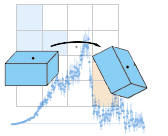
| HOME | PEOPLE | RESEARCH | ACADEMICS | TRAVEL/VISITORS | LINKS | CONTACT |

|
Web Mail
Mailing Lists
Computing Resources
Site Map
Thesis Defense: Robustness, Complexity, Validation and Risk
Xin Liu
Thursday, February 15, 20072:00 PM to 4:00 PM
Steele 114 (CDS Library)
A robust design process starts with modeling of the physical system and the uncertainty it faces. Robust design tools are then applied to achieve specified performance criteria. Verification of system properties is crucial as improvements on the modeling and design practices can be made based on results of such verification. In this thesis, we discuss three aspects of this closed-loop process.
First and the most important aspect is the possibility of the feedback from verification to system modeling and design. When verification is hard, what does it tell us about our system? When the system is robust, would it be easy to verify so? We study the relation between robustness of a system property posed as a decision problem and the proof complexity of verifying such property. We examine this relation in two classes of problems: percolation lattices and linear programming problems and show complexity is upper-bounded by the reciprocal of robustness, ie fragility.
The second aspect we study is model validation. More precisely, when given a candidate model and experiment data, how do we rigorously refute the model or gain information about the consistent parameter set? Different methods for model invalidation and parameter inference are demonstrated with the G-protein signaling system in yeast to show the advantages and hurdles in their applications.
While quantification of robustness requirements has been well-studied in engineering, it is just emerging in the field of finance. Robustness specification in finance is closely related to the availability of proper risk measures. We study the estimation of a coherent risk measure, Expected Shortfall (ES). A consistent and asymptotically normal estimator for ES based on empirical likelihood is proposed. Although empirical likelihood based estimators usually involve numerically solving optimization problems that are not necessarily convex, computation of our estimator can be carried out in a sequential manner, avoiding solving non-convex optimization problems.
|
©2003-2011 California Institute of Technology. All Rights Reserved webmaster |
|